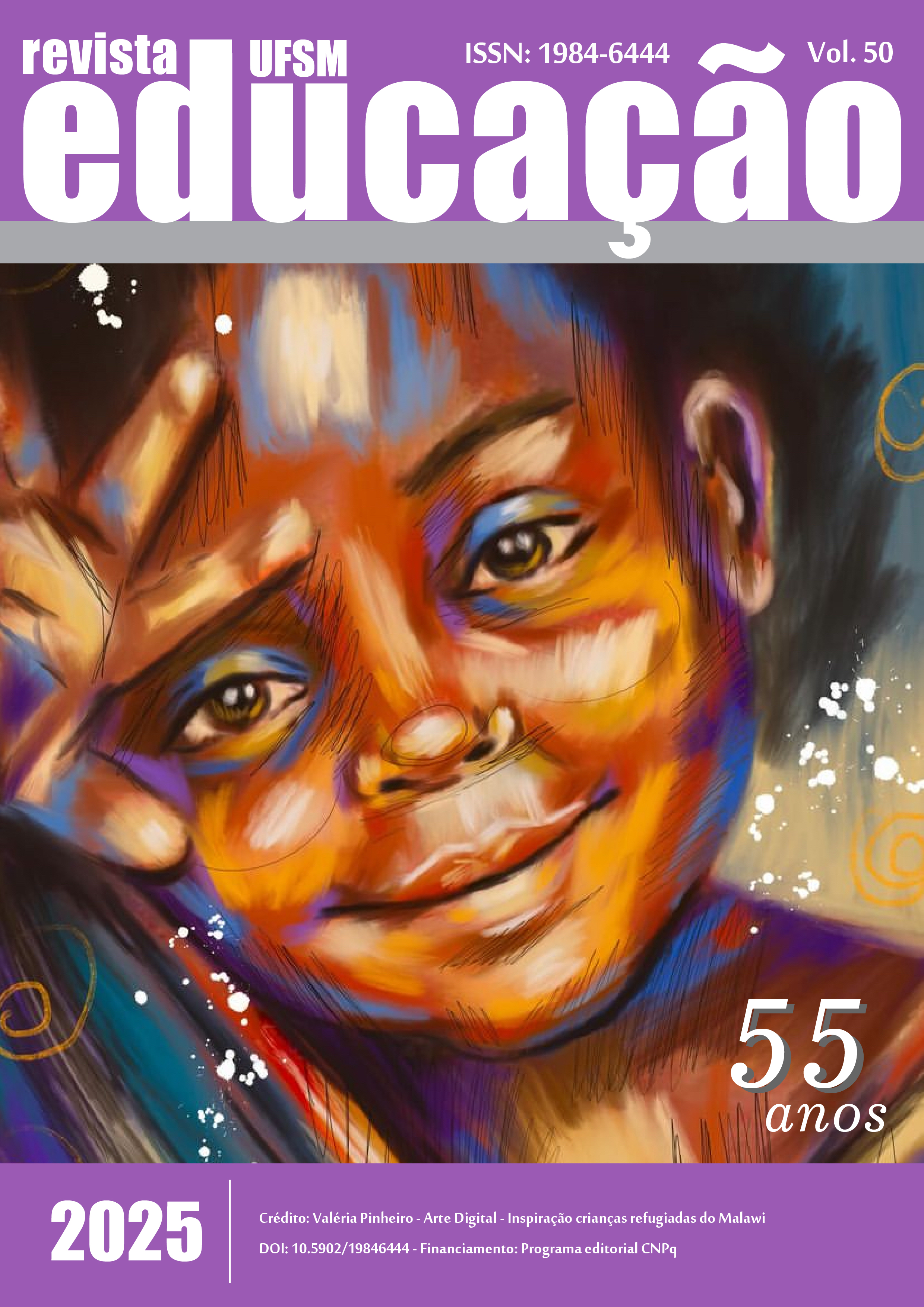The beautiful gesture of corazoning and the risk of reintroducing the reason-emotion binarism
DOI:
https://doi.org/10.5902/1984644485857Keywords:
Corazonar, Other epistemologies, Intellectual task, BinarismAbstract
This article takes up the provocation of the indigenous teacher Tule Abadio Green Stocel, for whom "going to the other and returning from the other" is not an intellectual problem, but a problem of the heart. From there, suggests on the fact that studying the other is something different from understanding them. It involves getting to know the lives of and with people. For him, research means changing the heart, the methodology. This sounds beautiful and has given rise to corazonar as a method developed by the Ecuadorian musician and anthropologist Guerrero Arias, an expression close to the frontier thinking that we suppose is necessary for this "going back and forth to the other", to understand the way subjects understand reality and offer creative responses based on their own thinking, but at the same time, it leads us to ask ourselves: doesn't this reintroduce the old binarism of emotion and reason, clashing with the pleasant impression that this beautiful expression makes on us? Having said that, we are actually interested in building a bridge between this "going back and forth to the other", in the sense of the "corazonar" of the Ecuadorian indigenous peoples (kitu kara), as well as our way of understanding/assuming it, which implies a relationship with what is represented, shaped by our intellectual task.
References
BAUDOT, Goerges; TODOROV, Tzvetan. Relatos astecas da conquista. Tradução de Luiz Antonio Oliveira de Araújo. São Paulo: Editora da UNESP, 2019.
BHABHA, Homi. The commitment to theory. New Formation, n. 05, 1988. Disponível em: https://www.professores.uff.br/ricardobasbaum/wp-content/uploads/sites/164/2022/03/Bhabha_Commitment_to_Theory.pdf Acesso en: 23 nov. 2023.
BLASER, Mario. Reflexiones sobre la ontología política de los conflictos medioambientales. América Crítica, n. 3, v. 2, 2019. Pp. 63-79. DOI: https://doi.org/10.2307/j.ctv1pbwvhs.12
CASTRO-GÓMEZ, Santiago. Transdisciplinariedad, latinoamericanismo y colonialidad. Coloquio con el profesor Santiago Castro-Gómez
Revista Historia Y Memória, vol. 1. 2010. Pp. 181-192.
CUESTAS-CAZA, Javier. El discurso del desarrollo en las políticas públicas: del postdesarrollo a la crítica decolonial. TraHs Números especiales, n. 4, 2019. Pp. 53-67. Disponível em: https://www.unilim.fr/trahs/1561&file=1/ Acesso em: 23 nov. 2023. DOI: https://doi.org/10.25965/trahs.1561
DUQUE, Carlos. La ampliación ontológico-política del Buen Vivir/Vivir Bien como praxis transmoderna. Tesis de Doctorado en Filosofía. Campinas: Universidad Estadual de Campinas, 2019.
GEERTZ, Clifford. El antropólogo como autor. Barcelona: Paidós, 1989.
GUERRERO ARIAS, Patricio. Corazonar desde las sabidurías insurgentes el sentido de las epistemologías dominantes, para construir sentidos otros de la existencia. Sophia, Colección de Filosofía de la Educación, n. 8. 2010. pp. 101-146. DOI: https://doi.org/10.17163/soph.n8.2010.05
GUERRERO ARIAS, Patricio. Colonialidad del saber e insurgencia de las sabidurías otras: Corazonar las epistemologías hegemónicas, como respuesta de insurgencia (de)colonial. Tesis de Doctorado en Estudios Culturales Latinoamericanos. Quito: Universidad Andina Simón Bolívar, 2016.
JECUPÉ, Kaká Werá. A terra dos mil povos. História indígena do Brasil contada por índio. 2ª. Ed. Revisada. São Paulo: Peirópolis, 2020.
PULIDO TIRADO, Genara. Violencia epistémica y descolonización del conocimiento. Sociocriticism, n. 24, v. 1 y 2, 2009. Pp. 173-201.
QUIJANO, Anibal. Colonialidad del poder, eurocentrismo y América Latina. En: Lander, Edgardo (Comp.). La colonialidad del saber: eurocentrismo y Ciencias Sociales. Perspectivas Latinoamericanas. Caracas: CLACSO. 2000. pp. 201-245.
RESTREPO, Luis. El derecho a la ternura. Bogotá: Arango, 2010.
ROSERO MORALES, José. Filosofía intercultural: Dificultades y desafíos en la enseñanza de la filosofía. Utopía y Praxis Latinoamericana, n. 25, v. 4, 2020. Pp. 50-62. Disponível em: https://www.redalyc.org/journal/279/27963704005/html/ Acesso em: 23 nov. 2023.
VALIENTE, Silvia; GODFRID, Julieta; BERTEA, Jorgelina. Transitando los márgenes: hacia una investigación de borde. Revista Huellas, n. 101, 2017. pp. 55-67. Disponivel em: http://www.uninorte.edu.co/web/huellas, Acesso em: 23 nov. 2023.
Published
How to Cite
Issue
Section
Categories
License
Copyright (c) 2025 Education

This work is licensed under a Creative Commons Attribution-NonCommercial 4.0 International License.
Declaration of originality
We declare that all articles present in the journal Educação (UFSM) are originals and were not submitted for publishing on any other publication, as a whole or a fraction. We also declare that, after being published by Educação (UFSM), a paper will not be submitted to another journal within two years. After this time, our journal transfers the publishing rights to the authors, with a permit granted by the Editorial Council.
We also acknowledge that the originals’ submission to Educação (UFSM) implies on a transference of copyright for physical and digital publishing to the journal. In case of noncompliance, the violator will receive sanctions and penalties predicted by the Brazilian Copyright Protection Law (n. 9610, dated 19/02/98).
Attribution 4.0 International (CC BY 4.0)
This license lets others remix, transform, and build upon the material for any purpose, even commercially, and copy and redistribute the material in any medium or format.

This work is licensed under a Creative Commons Attribution 4.0 International (CC BY 4.0)






